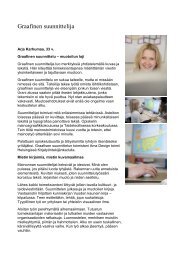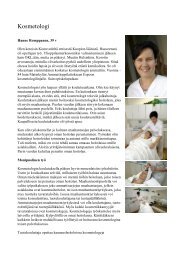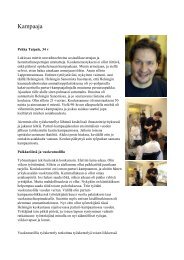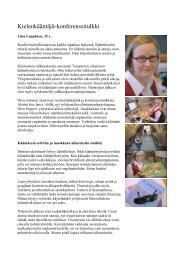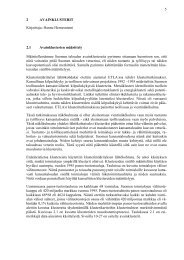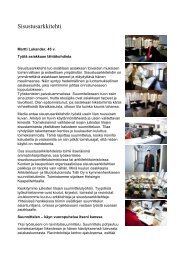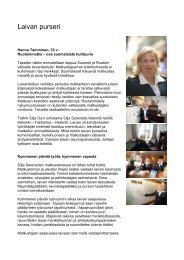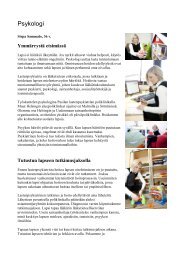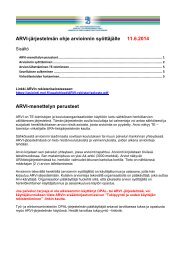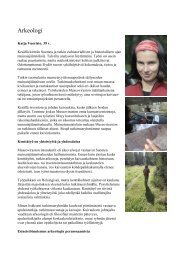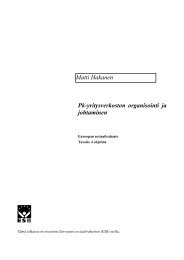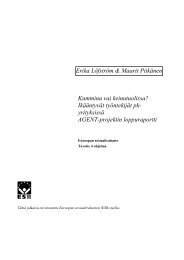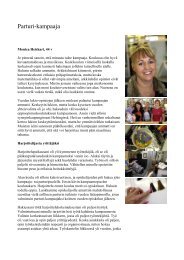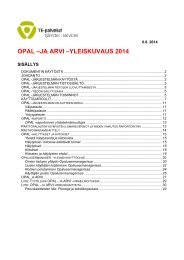Working Life Barometer in the Baltic Countries 2002 (pdf) - mol.fi
Working Life Barometer in the Baltic Countries 2002 (pdf) - mol.fi
Working Life Barometer in the Baltic Countries 2002 (pdf) - mol.fi
Create successful ePaper yourself
Turn your PDF publications into a flip-book with our unique Google optimized e-Paper software.
196<br />
home <strong>in</strong> connection with <strong>the</strong>ir ma<strong>in</strong> job. <strong>Work<strong>in</strong>g</strong> solely at home, however, is<br />
extremely rare. The Lithuanian data on this aspect are lack<strong>in</strong>g due to a technical<br />
error concern<strong>in</strong>g <strong>the</strong> <strong>in</strong>terviews. In Latvia and Estonia - as <strong>in</strong> F<strong>in</strong>land - of<br />
those do<strong>in</strong>g <strong>the</strong>ir job at least partly at home, slightly over half 4 were work<strong>in</strong>g<br />
<strong>in</strong> <strong>the</strong> private sector.<br />
LATVIA ESTONIA FINLAND<br />
Works occasionally or partially at home 28 % 28 % 26 %<br />
Works at home only 1 % 2 % 1 %<br />
Does not work at home at all 68 % 70 % 73 %<br />
Does not know 3 % 0 % 0 %<br />
Total 100 %<br />
(N=904)<br />
100 %<br />
(N=900)<br />
100 %<br />
(N=1297)<br />
Do<strong>in</strong>g paid work at home, whe<strong>the</strong>r it is telework by def<strong>in</strong>ition or not, has a<br />
strong l<strong>in</strong>k with <strong>the</strong> person's position <strong>in</strong> <strong>the</strong> work organisation (cf. Pekkola<br />
<strong>2002</strong>). In Latvia, over half of those <strong>in</strong> a managerial post and a little under half<br />
of <strong>the</strong> specialists did at home some tasks connected with <strong>the</strong>ir ma<strong>in</strong> job.<br />
Among <strong>the</strong> o<strong>the</strong>r personnel categories, <strong>the</strong> proportions were noticeably<br />
smaller. The situation <strong>in</strong> Estonia is o<strong>the</strong>rwise <strong>the</strong> same, but as many as twothirds<br />
of <strong>the</strong> managers did work at home <strong>in</strong> connection with <strong>the</strong>ir pr<strong>in</strong>cipal job.<br />
Those <strong>in</strong> <strong>the</strong> upper ranks of <strong>the</strong> personnel hierarchy have more autonomy <strong>in</strong><br />
choos<strong>in</strong>g <strong>the</strong> place and time of do<strong>in</strong>g <strong>the</strong>ir tasks than o<strong>the</strong>r workers have. The<br />
work of managers and specialists is often of such a nature that it is possible to<br />
do part of it outside <strong>the</strong> workplace. On <strong>the</strong> o<strong>the</strong>r hand it is also true, at least to<br />
a certa<strong>in</strong> extent, that tight schedules impose a ra<strong>the</strong>r large quantity of work,<br />
and thus overtime. In this case, it rema<strong>in</strong>s for <strong>the</strong> worker to choose exactly<br />
when and where <strong>the</strong> work is done. It can be assumed that <strong>the</strong> work carried<br />
home is fairly often <strong>the</strong> uncompensated type of overtime work. In Latvia for<br />
example, 29 % of those do<strong>in</strong>g <strong>the</strong>ir ma<strong>in</strong> job partly at home said that <strong>the</strong>y did<br />
overtime without any compensation. Of those Latvians who did not work at<br />
home, 16 % did uncompensated overtime. In all, uncompensated overtime was<br />
done by 19 % of Latvia's work<strong>in</strong>g population.<br />
4<br />
In Latvia 55 %, <strong>in</strong> Estonia 57 % and <strong>in</strong> F<strong>in</strong>land 54 % of those do<strong>in</strong>g <strong>the</strong>ir job at least partly at home<br />
were work<strong>in</strong>g <strong>in</strong> <strong>the</strong> private sector.



